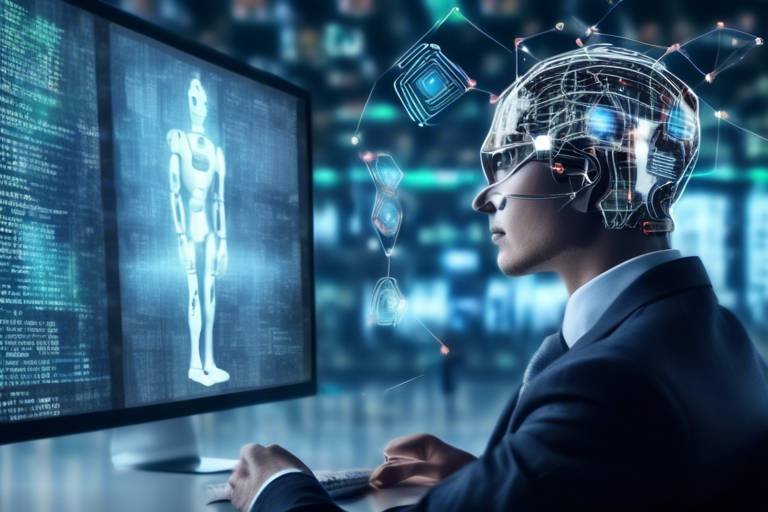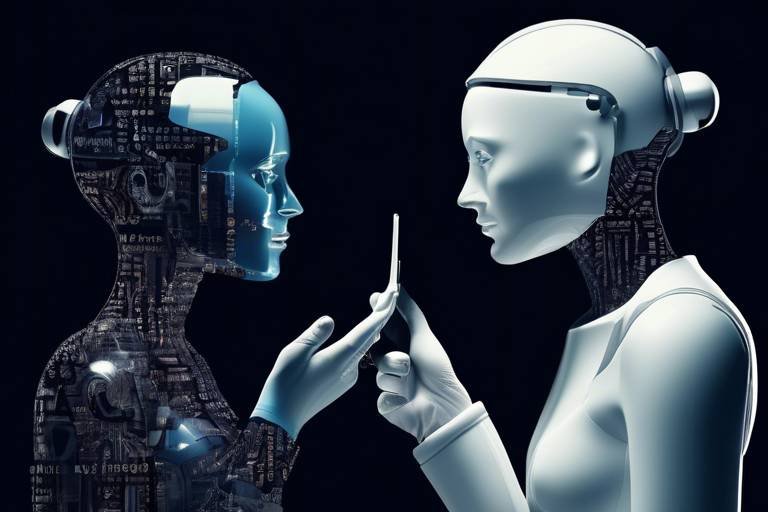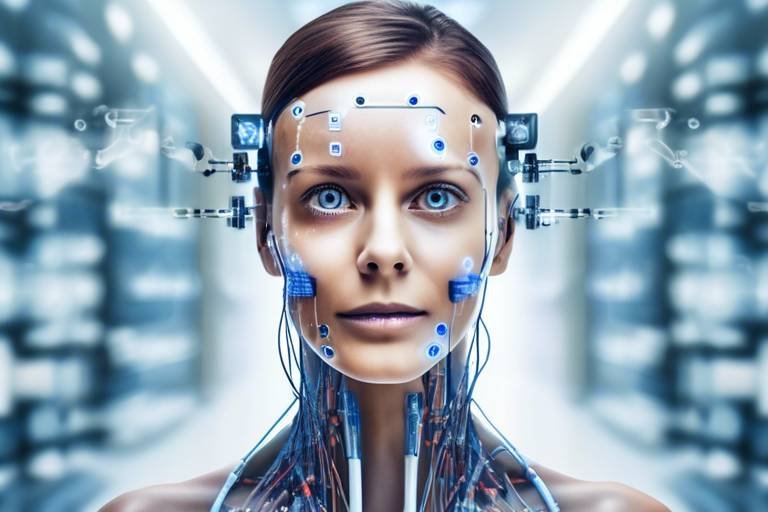The Evolution and Future of AI in Business
Artificial Intelligence (AI) has come a long way from its inception, evolving from a concept in science fiction to a powerful tool that is reshaping the business landscape. The journey of AI in business is not just a tale of technological advancement; it’s a narrative filled with innovation, adaptation, and a touch of magic. Imagine a world where machines can learn, adapt, and even predict outcomes based on vast amounts of data. Sounds like a plot from a futuristic movie, right? But this is the reality we live in today, and it’s only going to get more exciting.
Initially, AI was primarily focused on solving complex mathematical problems and performing calculations at speeds far beyond human capabilities. However, as technology progressed, the focus shifted towards developing algorithms that could learn from data. This transition marked the beginning of a new era where AI could not only analyze data but also make intelligent decisions.
The integration of AI into business processes has been gradual yet profound. Early adopters were primarily in the tech sector, utilizing AI for data analysis and customer insights. Fast forward to today, and we see AI permeating various industries, including healthcare, finance, retail, and manufacturing. Each sector has harnessed AI's capabilities to enhance operational efficiency, improve customer engagement, and drive innovation.
As we look towards the future, the potential for AI in business seems limitless. Companies are increasingly relying on AI to provide insights that were previously unimaginable. For instance, AI can analyze consumer behavior in real-time, allowing businesses to tailor their offerings and marketing strategies to meet the ever-changing demands of the market.
But what does this mean for the future of businesses? Well, it suggests a shift towards more data-driven decision-making. The ability to predict trends and customer preferences will not only enhance operational efficiency but also create a competitive edge in the market. Companies that embrace AI will likely thrive, while those that resist may find themselves left behind in the dust of technological advancement.
Furthermore, the future of AI in business is closely tied to the development of ethical frameworks. As AI continues to evolve, we must address the ethical implications of its use. Questions surrounding bias, privacy, and accountability will need to be at the forefront of discussions among business leaders and policymakers alike. The goal is to create AI systems that are not only effective but also fair and transparent.
In summary, the evolution of AI in business is a captivating journey marked by significant milestones and groundbreaking innovations. As we stand on the brink of a new era, it is essential for businesses to embrace AI responsibly and strategically. The future is bright for those who are willing to adapt and innovate, paving the way for a more efficient, intelligent, and ethical business landscape.
- What is AI in business? AI in business refers to the use of artificial intelligence technologies to enhance operations, improve decision-making, and provide better customer experiences.
- How does AI improve operational efficiency? AI improves operational efficiency by automating repetitive tasks, analyzing data quickly, and providing actionable insights that help businesses make informed decisions.
- What industries are most affected by AI? AI is significantly impacting industries such as healthcare, finance, retail, and manufacturing by transforming processes and enhancing productivity.
- What are the ethical concerns surrounding AI? Ethical concerns include issues of bias in AI algorithms, data privacy, and the need for accountability in AI decision-making processes.
- How can businesses prepare for the future of AI? Businesses can prepare by investing in AI technologies, training their workforce in AI-related skills, and developing ethical guidelines for AI usage.

The Historical Context of AI in Business
To truly appreciate the transformative power of artificial intelligence (AI) in today's business landscape, we need to take a step back and explore its historical context. The journey of AI is not just a tale of technological advancement; it's a story of human ingenuity, vision, and the relentless pursuit of efficiency. From its inception in the mid-20th century to its current applications, AI has undergone several pivotal transformations that have shaped its role in various industries.
The concept of AI can be traced back to the 1950s when pioneers like Alan Turing and John McCarthy laid the groundwork for machine learning and computational intelligence. Turing's famous question, "Can machines think?" sparked a wave of curiosity and research that would eventually lead to the development of algorithms capable of mimicking human cognition. In 1956, the Dartmouth Conference marked a significant milestone, as it was here that the term "artificial intelligence" was first coined, and researchers began to envision machines that could learn and adapt.
Throughout the 1960s and 1970s, AI research flourished, primarily in academia. Early successes included expert systems designed to solve specific problems, such as medical diagnosis and financial forecasting. These systems relied heavily on rule-based logic and were limited by the computational power of the time. However, they laid the foundation for future developments by demonstrating that machines could assist in complex decision-making processes.
Fast forward to the 1980s and 1990s, and we see a shift in AI research fueled by advancements in computer technology. The introduction of neural networks and fuzzy logic allowed for more sophisticated data processing capabilities. This era saw the rise of AI applications in industries like finance, where algorithms began to analyze market trends and assist traders in making informed decisions. Yet, despite these advancements, the hype surrounding AI led to unrealistic expectations, resulting in what is known as the "AI winter," a period of reduced funding and interest.
The turn of the millennium brought a resurgence of AI, thanks in large part to the exponential growth of data and improvements in computing power. The advent of the internet and big data analytics provided a treasure trove of information for AI systems to learn from. In this new era, machine learning, particularly deep learning, emerged as a game-changer, enabling AI to recognize patterns and make predictions with unprecedented accuracy.
Today, AI is embedded in our daily lives and is transforming industries at an astonishing pace. Businesses are leveraging AI technologies to enhance operational efficiency, improve customer engagement, and drive innovation. For instance, AI-powered chatbots are revolutionizing customer service by providing instant responses to inquiries, while predictive analytics in supply chain management is optimizing inventory levels and reducing costs.
As we look back at the historical context of AI in business, it's clear that its evolution has been marked by both challenges and triumphs. The journey from theoretical concepts to practical applications has paved the way for a future where AI is not just a tool but a fundamental component of business strategy. Understanding this history allows us to appreciate the potential of AI and anticipate the changes it will continue to bring to the business landscape.

Current Applications of AI in Various Industries
Artificial Intelligence (AI) has rapidly become a cornerstone in the modern business landscape, reshaping how industries operate and deliver value. From finance to healthcare, AI is not just a buzzword; it’s a powerful tool that enhances efficiency, decision-making, and customer engagement. Imagine a world where machines can analyze data faster than the blink of an eye, making predictions that once took humans weeks to figure out. That’s the magic of AI!
In the finance sector, for instance, AI algorithms are employed to sift through vast amounts of data, identifying patterns that help in risk assessment and fraud detection. Financial institutions utilize AI to create personalized banking experiences, tailoring services to meet individual customer needs. This not only improves customer satisfaction but also builds trust. According to a recent study, over 70% of financial institutions are investing in AI technologies to enhance their services.
Healthcare is another area where AI is making significant strides. With the integration of machine learning and data analytics, healthcare providers can now analyze patient data to improve diagnostics and treatment plans. AI-driven patient management systems are streamlining operations, reducing administrative burdens, and allowing healthcare professionals to focus more on patient care. For example, AI tools can automate scheduling, follow-ups, and even patient monitoring, leading to a more efficient healthcare system.
Retail is also experiencing a transformation thanks to AI. Retailers are leveraging AI to analyze consumer behavior, optimize inventory, and personalize marketing strategies. Imagine walking into a store where the system already knows your preferences and suggests products tailored just for you. This is becoming a reality as AI systems learn from customer interactions. A recent survey showed that 60% of retailers are using AI to enhance customer experience.
Furthermore, AI chatbots are revolutionizing customer service in retail. These bots can handle inquiries, provide information, and even assist with purchases, all while learning from each interaction to improve future responses. This not only enhances customer engagement but also reduces operational costs for businesses.
The manufacturing sector is also reaping the benefits of AI. Smart factories equipped with AI technologies can monitor equipment performance in real-time, predicting maintenance needs before they become critical. This proactive approach minimizes downtime and enhances productivity. In fact, companies implementing AI in manufacturing have reported a 20-30% increase in operational efficiency.
Moreover, AI-driven robotics are streamlining assembly lines, performing tasks that were once labor-intensive. These robots can work alongside humans, taking on repetitive tasks and allowing workers to focus on more complex activities. The result? A more agile and efficient manufacturing process.
Transportation is yet another industry where AI is making waves. From optimizing delivery routes to enhancing safety features in vehicles, AI is transforming how goods and people are moved. Self-driving technology, powered by sophisticated AI algorithms, is not just a futuristic concept; it’s becoming a reality. Companies are investing heavily in autonomous vehicles, which promise to reduce traffic accidents and improve efficiency in logistics.
In summary, AI is not merely a tool; it’s a game-changer across various industries. Its applications are diverse and impactful, driving efficiency, enhancing customer experiences, and ultimately reshaping business models. As we continue to explore the potential of AI, it’s clear that we are only scratching the surface of what this technology can achieve.
- What industries are currently benefiting from AI? AI is being utilized in finance, healthcare, retail, manufacturing, and transportation, among others.
- How does AI improve customer experience? AI enhances customer experience through personalized recommendations, efficient service, and predictive analytics.
- What are the ethical concerns surrounding AI? Ethical concerns include bias in algorithms, privacy issues, and the potential for job displacement.
- Is AI the future of business? Yes, AI is expected to play a crucial role in shaping the future of business by enhancing operational efficiency and customer engagement.

AI in Healthcare
Artificial Intelligence (AI) is making waves in the healthcare sector, transforming the way medical professionals diagnose, treat, and manage patient care. Imagine a world where doctors have the power of advanced algorithms at their fingertips, helping them make faster and more accurate decisions. This isn't just a dream; it's happening right now! From predictive analytics to personalized medicine, AI is revolutionizing healthcare by enhancing diagnostic accuracy, improving treatment outcomes, and streamlining patient management.
One of the most exciting advancements in healthcare AI is the use of machine learning algorithms for diagnostics. These algorithms analyze vast amounts of medical data, identifying patterns that may be invisible to the human eye. For instance, AI can sift through thousands of medical images, such as X-rays and MRIs, to detect anomalies with remarkable precision. This not only speeds up the diagnostic process but also significantly reduces the chances of human error. A study published in a leading medical journal revealed that AI systems could outperform radiologists in identifying certain conditions, showcasing the potential of technology to enhance human capabilities.
Furthermore, AI-driven patient management systems are gaining traction in healthcare facilities. These systems automate various administrative tasks, such as scheduling appointments, sending reminders, and managing follow-ups. Picture a scenario where a patient receives an automatic reminder for their next check-up, along with personalized health tips based on their medical history. This not only improves patient engagement but also alleviates the burden on healthcare staff, allowing them to focus more on direct patient care. The result? A more efficient healthcare system that prioritizes patient experience and operational efficiency.
In addition to diagnostics and patient management, AI is also playing a crucial role in personalized treatment plans. By analyzing data from various sources, including genetic information, lifestyle factors, and previous treatment outcomes, AI can help healthcare providers tailor treatments to individual patients. This means that instead of a one-size-fits-all approach, patients receive care that is specifically designed for their unique needs. The implications of this are profound, as it could lead to better health outcomes and a more effective allocation of resources in healthcare systems.
As we look to the future, the integration of AI in healthcare promises to expand even further. Innovations such as virtual health assistants and AI-powered chatbots are already being deployed to provide patients with immediate answers to their health-related queries. These tools not only enhance patient access to information but also help healthcare providers manage their workloads more effectively. As a result, patients can receive timely care, and healthcare professionals can dedicate more time to complex cases that require human intervention.
In summary, AI is reshaping the healthcare landscape in ways we could only imagine a few years ago. By enhancing diagnostics, improving patient management, and personalizing treatment plans, AI is set to redefine how we approach health and wellness. The journey is just beginning, and the potential for AI in healthcare is limitless!
- How is AI changing healthcare? AI is improving diagnostics, personalizing treatment plans, and streamlining patient management.
- What are the benefits of AI in diagnostics? AI enhances accuracy, speeds up the diagnostic process, and reduces human error.
- Can AI replace healthcare professionals? No, AI is meant to assist healthcare professionals, not replace them. It enhances their capabilities.
- What is a virtual health assistant? A virtual health assistant is an AI-powered tool that provides patients with immediate answers to health-related questions.

Machine Learning for Diagnostics
Machine learning is not just a buzzword; it's a game-changer in the realm of diagnostics. Imagine a world where machines can analyze vast amounts of medical data in the blink of an eye, spotting patterns that even the most seasoned doctors might miss. This is the reality we are stepping into today. With the integration of machine learning algorithms into diagnostic processes, healthcare professionals are empowered to make more accurate and timely decisions, ultimately leading to better patient outcomes.
At the core of this transformation lies the ability of machine learning to process and learn from large datasets. These algorithms can sift through mountains of medical records, imaging data, and genetic information, identifying correlations and anomalies that can indicate the presence of diseases. For instance, in radiology, machine learning models are trained to recognize signs of conditions like pneumonia or tumors in X-rays and MRIs with remarkable precision. The speed and accuracy of these algorithms can significantly reduce the time it takes to diagnose critical conditions, which can be the difference between life and death.
Moreover, the predictive capabilities of machine learning extend beyond mere diagnostics. By analyzing historical data, these systems can predict disease outbreaks, allowing healthcare providers to take proactive measures. This is particularly vital in managing public health crises, where early detection can save countless lives. The integration of machine learning in diagnostics is not just enhancing accuracy; it’s reshaping the entire landscape of patient care.
To illustrate the impact of machine learning in diagnostics, consider the following table that highlights some key applications:
| Application | Description | Benefits |
|---|---|---|
| Image Analysis | Using algorithms to interpret medical images. | Increased accuracy and speed in identifying conditions. |
| Predictive Analytics | Forecasting potential health issues based on patient data. | Proactive treatment and improved patient outcomes. |
| Genomic Data Analysis | Analyzing genetic information to identify predispositions to diseases. | Personalized medicine and targeted therapies. |
While the promise of machine learning in diagnostics is undeniable, it’s essential to approach its implementation with caution. Data privacy concerns and the need for robust validation processes are paramount. Ensuring that these systems are trained on diverse datasets is crucial to avoid biases that could lead to misdiagnosis. As we continue to integrate machine learning into healthcare, we must prioritize ethical considerations to maintain trust in these powerful technologies.
In conclusion, machine learning is revolutionizing diagnostics, offering unprecedented accuracy and efficiency. As we embrace these advancements, the future of healthcare looks brighter than ever. The potential to save lives and enhance patient care is immense, and with responsible implementation, we can harness the power of machine learning to transform the healthcare landscape.
- What is machine learning in diagnostics?
Machine learning in diagnostics refers to the use of algorithms that can analyze medical data to identify diseases and conditions more accurately and quickly than traditional methods. - How does machine learning improve diagnostic accuracy?
By processing large datasets and recognizing patterns, machine learning algorithms can detect anomalies that may be overlooked by human professionals, leading to more accurate diagnoses. - Are there any risks associated with using machine learning in healthcare?
Yes, there are risks, including data privacy concerns and potential biases in algorithms if not trained on diverse datasets. Ensuring ethical practices is crucial. - What are some examples of machine learning applications in diagnostics?
Examples include image analysis for radiology, predictive analytics for disease outbreaks, and genomic data analysis for personalized medicine.

AI-Driven Patient Management Systems
In the ever-evolving landscape of healthcare, are emerging as game-changers, fundamentally altering how healthcare providers interact with patients and manage their care. These systems utilize sophisticated algorithms and data analytics to streamline processes, enhance communication, and ultimately improve patient outcomes. Imagine walking into a clinic where the check-in process is seamless, the wait times are minimized, and your treatment plan is tailored specifically to your needs—all thanks to the power of artificial intelligence.
One of the most significant advantages of AI-driven patient management systems is their ability to automate administrative tasks. For instance, scheduling appointments can often feel like a never-ending game of phone tag. However, with AI, patients can book, reschedule, or cancel appointments through user-friendly interfaces, reducing the burden on administrative staff. This not only saves time but also allows healthcare professionals to focus more on patient care rather than paperwork.
Moreover, these systems can proactively manage follow-ups, ensuring that patients receive timely reminders for their appointments, medication refills, and necessary tests. This proactive approach not only enhances patient adherence to treatment plans but also fosters a sense of accountability and engagement among patients. Imagine receiving a friendly reminder about your upcoming appointment or a nudge to take your medication—these small touches can significantly improve health outcomes.
AI-driven systems also excel in data analysis, allowing healthcare providers to gain insights into patient behaviors and trends. By analyzing vast amounts of data, these systems can identify patterns that may indicate potential health issues before they escalate. For example, if a patient frequently misses appointments or fails to take prescribed medications, the system can alert healthcare providers to intervene early, potentially preventing more serious health complications down the line.
Furthermore, the integration of AI in patient management systems enables personalized care. By leveraging data from various sources, including electronic health records (EHRs) and wearable devices, these systems can create customized treatment plans that consider a patient's unique medical history, lifestyle, and preferences. This level of personalization not only enhances the patient experience but also leads to better health outcomes, as treatments are tailored to what works best for each individual.
As we look to the future, the role of AI in patient management systems is poised to expand even further. With advancements in technology, we can expect to see features such as predictive analytics, which can anticipate patient needs and streamline care even more effectively. For instance, AI could analyze a patient's history and predict potential complications, allowing healthcare providers to take preventive measures before issues arise.
In conclusion, AI-driven patient management systems are not just a trend; they represent a significant leap forward in how healthcare is delivered. By automating administrative tasks, enhancing patient engagement, and providing personalized care, these systems are revolutionizing the patient experience and improving health outcomes. As technology continues to advance, we can only imagine the possibilities that lie ahead in the realm of AI and healthcare.
- What are AI-driven patient management systems?
These are advanced systems that utilize artificial intelligence to automate and enhance the management of patient care, including scheduling, follow-ups, and personalized treatment plans.
- How do these systems improve patient care?
By streamlining administrative tasks, enhancing communication, and providing personalized insights, AI-driven systems enable healthcare providers to focus more on patient care and improve health outcomes.
- Can AI predict health issues before they arise?
Yes, AI can analyze patient data to identify trends and patterns that may indicate potential health issues, allowing for early intervention and preventive care.

AI in Finance
In the dynamic world of finance, artificial intelligence is not just a buzzword; it's a game-changer. Imagine a world where your bank knows your spending habits better than you do, or where investment firms can predict market trends with uncanny accuracy. This is the reality that AI is creating in the finance sector. From risk assessment to fraud detection, AI technologies are revolutionizing how financial institutions operate. By leveraging vast amounts of data, AI algorithms can analyze patterns and make predictions that were once the realm of human intuition.
One of the most significant applications of AI in finance is in risk management. Financial institutions face various risks, from market volatility to credit defaults. AI systems can assess these risks in real-time by analyzing data from multiple sources, including social media trends, economic indicators, and historical data. This not only enhances decision-making but also allows companies to respond swiftly to emerging threats. For instance, a bank might use AI to identify potential loan defaults before they happen, allowing them to mitigate losses proactively.
Another critical area where AI shines is in fraud detection. Traditional methods of fraud detection often rely on historical data and predefined rules, which can be slow and reactive. In contrast, AI systems employ machine learning algorithms that continuously learn and adapt. They can identify unusual patterns in transactions, flagging them for further investigation. This proactive approach significantly reduces the chances of fraudulent activities slipping through the cracks. According to a recent study, AI-driven fraud detection systems can reduce false positives by up to 50%, allowing financial institutions to focus their resources more effectively.
Furthermore, AI is transforming the way financial institutions interact with their customers. With the rise of chatbots and virtual assistants, banks can provide 24/7 customer service without the need for human intervention. These AI-driven tools can answer customer queries, assist with transactions, and even provide personalized financial advice. Imagine having a virtual financial advisor that can analyze your spending habits and suggest ways to save money or invest wisely. This level of personalization not only enhances customer satisfaction but also fosters loyalty in an increasingly competitive market.
Lastly, AI is paving the way for personalized banking experiences. By analyzing customer data, financial institutions can tailor their offerings to meet individual needs. This could mean customized loan options, investment strategies, or even personalized marketing messages. The ability to provide such targeted services not only improves customer engagement but also drives revenue growth for banks and financial institutions. In fact, a recent report indicated that companies leveraging AI for personalized marketing saw a 20% increase in customer retention rates.
As we look to the future, the integration of AI in finance will likely continue to expand. With advancements in technology, we can expect even more sophisticated applications that will enhance security, improve efficiency, and deliver unparalleled customer experiences. However, as with any powerful tool, the responsible use of AI is crucial to ensure that it serves the best interests of both businesses and consumers alike.
- How is AI used in risk management within finance? AI analyzes vast amounts of data to assess risks in real-time, allowing financial institutions to respond quickly to potential threats.
- Can AI help in reducing fraud? Yes, AI systems use machine learning to detect unusual transaction patterns, significantly improving fraud detection rates.
- What role do chatbots play in the finance sector? Chatbots provide 24/7 customer service, helping customers with inquiries and transactions without human intervention.
- How does AI personalize banking experiences? AI analyzes customer data to offer tailored financial products and services, enhancing customer satisfaction and loyalty.

The Future Trends of AI in Business
The future of artificial intelligence (AI) in business is not just a topic for tech enthusiasts; it’s a reality that’s reshaping how companies operate, engage with customers, and make decisions. As we look ahead, several key trends are emerging that promise to redefine the corporate landscape. One of the most significant trends is the increasing integration of AI with big data analytics. Businesses are realizing that the vast amounts of data they generate can be harnessed to inform strategic decisions, predict market trends, and enhance customer experiences. Imagine having a crystal ball that not only tells you what your customers want but also anticipates their needs before they even know them!
Moreover, the rise of natural language processing (NLP) is set to revolutionize customer interactions. Companies are investing in AI-driven chatbots and virtual assistants that can engage customers in meaningful conversations, providing personalized recommendations and support 24/7. This shift towards more human-like interactions can significantly enhance customer satisfaction and loyalty. It’s akin to having a dedicated customer service representative who is always available, ready to assist with a smile—well, at least a digital one!
Another trend to watch is the growing focus on ethical AI. As AI technologies become more pervasive, there is an increasing awareness of the ethical implications surrounding their use. Companies are now prioritizing the development of responsible AI practices that ensure fairness, transparency, and accountability. This shift is not just about compliance; it’s about building trust with consumers who are becoming more conscious of how their data is used. In a world where data breaches and privacy concerns dominate headlines, businesses that prioritize ethical AI will likely find themselves at a competitive advantage.
In addition, the integration of AI in remote work environments is expected to surge. The COVID-19 pandemic accelerated the adoption of remote work, and businesses are now looking for AI tools that can enhance productivity and collaboration among dispersed teams. From AI-driven project management tools to virtual collaboration platforms, the future of work will be heavily influenced by AI technologies that facilitate seamless communication and task management.
Furthermore, the AI landscape is witnessing a shift towards collaborative AI, where machines and humans work together to achieve common goals. This trend emphasizes the importance of human oversight in AI decision-making processes, ensuring that technology complements human skills rather than replacing them. Companies that embrace this collaborative approach will not only enhance their operational efficiency but also foster a more inclusive workplace culture.
As we venture further into the future, it’s also essential to consider the implications of AI on workforce development. The skills required in the job market are evolving, and businesses will need to invest in reskilling their employees to adapt to these changes. The demand for data analysts, AI specialists, and machine learning engineers will continue to rise, but so will the need for soft skills such as creativity, emotional intelligence, and critical thinking. Companies that prioritize ongoing education and training will be better positioned to thrive in this AI-driven economy.
To summarize, the future trends of AI in business are not just about technological advancements; they encompass a broader vision of how companies can leverage AI to create value, foster innovation, and build lasting relationships with their customers. As we embrace these changes, it’s crucial for businesses to remain agile and open to new possibilities, ensuring that they stay ahead in this rapidly evolving landscape.
- What are the key trends of AI in business?
The key trends include the integration of big data analytics, natural language processing, ethical AI practices, AI in remote work environments, and collaborative AI. - How is AI changing customer interactions?
AI is enhancing customer interactions through chatbots and virtual assistants that provide personalized support and recommendations. - Why is ethical AI important?
Ethical AI is crucial for building trust with consumers and ensuring that AI technologies are used responsibly and transparently. - What skills will be in demand in the AI-driven economy?
Skills in data analysis, AI specialization, and soft skills like creativity and emotional intelligence will be increasingly important.

Ethical Considerations in AI
As artificial intelligence continues to weave itself into the fabric of our daily lives and business operations, it's crucial to pause and reflect on the ethical considerations that accompany this powerful technology. The rapid evolution of AI brings forth a multitude of challenges that can affect individuals and society as a whole. Issues like bias, privacy, and transparency demand our attention, as they hold the potential to either enhance or undermine the benefits that AI promises.
One of the most pressing concerns is algorithmic bias. AI systems learn from data, and if that data reflects historical inequalities or prejudices, the AI can perpetuate or even amplify these biases. For instance, in hiring processes, AI tools may favor candidates based on biased data, inadvertently disadvantaging qualified individuals from underrepresented groups. This raises the question: how can we ensure that AI systems are fair and equitable? Addressing this issue requires organizations to actively audit their AI systems and implement bias mitigation strategies.
Another significant ethical consideration is privacy. With AI's capacity to analyze vast amounts of personal data, the potential for misuse is alarming. Companies must navigate the fine line between leveraging data for improved services and respecting individuals' privacy rights. To foster trust, businesses must be transparent about how they collect, use, and store data. Implementing robust data protection policies and adhering to regulations like the GDPR can help mitigate privacy concerns.
Furthermore, the transparency of AI systems is essential. Many AI algorithms operate as "black boxes," making it difficult for users to understand how decisions are made. This lack of transparency can lead to skepticism and distrust. Companies should strive to develop explainable AI models that allow users to comprehend the reasoning behind AI-generated outcomes. By making AI more understandable, organizations can foster a culture of accountability and trust.
In addition to these challenges, the ethical implications of AI extend to its impact on employment. As AI systems automate tasks, there is a growing concern about job displacement. While AI can enhance operational efficiency, it also raises questions about the future of employment and the skills required in the workforce. How can we prepare for a future where AI takes over certain jobs? This calls for a concerted effort in reskilling and upskilling the workforce to adapt to new roles that AI creates.
To navigate these ethical challenges effectively, businesses can adopt a framework that includes:
- Regular audits of AI systems to detect and mitigate bias.
- Implementing strong data privacy policies that prioritize user consent.
- Developing explainable AI systems that enhance transparency.
- Investing in workforce development programs to prepare employees for AI integration.
In conclusion, the ethical considerations surrounding AI are complex and multifaceted. As we continue to explore the transformative potential of AI in business, it is imperative that we prioritize ethical practices. By addressing bias, protecting privacy, ensuring transparency, and preparing the workforce for change, we can harness the benefits of AI while safeguarding the values that matter most to society.
Q1: What is algorithmic bias in AI?
A1: Algorithmic bias occurs when an AI system reflects historical prejudices found in its training data, leading to unfair outcomes in decision-making processes.
Q2: How can companies ensure data privacy in AI?
A2: Companies can ensure data privacy by implementing strong data protection policies, obtaining user consent, and complying with regulations like the GDPR.
Q3: Why is transparency important in AI systems?
A3: Transparency is crucial because it allows users to understand how AI systems make decisions, fostering trust and accountability in business practices.
Q4: What does reskilling mean in the context of AI?
A4: Reskilling refers to training employees to acquire new skills that are relevant in an AI-driven economy, allowing them to adapt to changing job roles.

AI and Workforce Transformation
As we stand on the brink of a new era defined by artificial intelligence, it's essential to recognize the profound impact AI is having on the workforce. Imagine a world where mundane tasks are automated, allowing employees to focus on more creative and strategic endeavors. This is not just a distant dream; it's happening right now. AI is reshaping job roles and skill requirements, creating a landscape that demands adaptability and continuous learning.
The integration of AI technologies into the workplace is akin to the introduction of the assembly line in manufacturing. Just as that innovation revolutionized production, AI is transforming how we work. Traditional roles are evolving, and new jobs are emerging that didn't exist a decade ago. For example, positions such as AI trainers, data analysts, and ethical AI compliance officers are becoming increasingly vital. These roles require a unique blend of technical skills and domain knowledge, highlighting the need for reskilling and upskilling across industries.
Moreover, the rise of AI brings forth a critical question: How do we prepare our workforce for this transformation? Organizations must take proactive steps to ensure their employees are equipped with the necessary skills to thrive in an AI-driven environment. This involves not just technical training, but also fostering a culture of lifelong learning. Companies can implement various strategies to facilitate this, including:
- Offering training programs focused on data literacy and AI technologies.
- Encouraging employees to participate in workshops and online courses.
- Creating mentorship opportunities where experienced employees can guide others in adapting to new tools and processes.
It's also important to address the emotional aspect of this transformation. Employees may feel apprehensive about AI taking over their jobs. However, it's crucial to communicate that AI is not here to replace humans but to augment their capabilities. For instance, in customer service, AI chatbots can handle routine inquiries, allowing human agents to tackle more complex issues that require empathy and critical thinking. This collaboration between humans and machines can lead to greater job satisfaction and improved outcomes.
As we look to the future, businesses must embrace this transformation and view AI as a partner in their growth journey. By investing in workforce development and fostering a culture of innovation, organizations can not only enhance productivity but also create a more engaged and skilled workforce. The key takeaway is that while AI will change the nature of work, it also presents an incredible opportunity for growth and advancement.
- How will AI impact my job?
AI is likely to automate routine tasks, allowing you to focus on more complex and creative aspects of your work. It may also create new job opportunities in emerging fields. - What skills should I develop to stay relevant in an AI-driven job market?
Focus on developing skills in data analysis, critical thinking, and emotional intelligence, as these will be valuable in collaboration with AI technologies. - How can companies support their employees during this transition?
Companies can provide training programs, encourage continuous learning, and create a supportive environment that fosters adaptability.
Frequently Asked Questions
-
What is the historical context of AI in business?
The historical context of AI in business dates back to its inception in the mid-20th century. Initially, AI technologies were primarily focused on simple tasks and data processing. Over the decades, significant milestones such as the development of machine learning algorithms and natural language processing have paved the way for more sophisticated applications. This evolution has allowed AI to seamlessly integrate into various industries, enhancing operational efficiency and decision-making capabilities.
-
How is AI currently used in healthcare?
In healthcare, AI is making waves by improving diagnostics, treatment plans, and patient management. Technologies like machine learning algorithms analyze vast amounts of medical data, leading to quicker and more accurate disease identification. Additionally, AI-driven patient management systems automate scheduling and follow-ups, significantly enhancing the patient experience while reducing administrative burdens for healthcare providers.
-
What are some applications of AI in finance?
The finance sector utilizes AI for various applications, including risk assessment, fraud detection, and personalized banking services. For instance, AI algorithms can analyze transaction patterns to identify potential fraudulent activities in real-time. Moreover, banks are using AI to tailor their services to individual customer needs, enhancing overall customer satisfaction and security.
-
What future trends can we expect in AI for business?
As technology continues to evolve, we can anticipate several future trends in AI for business. Emerging innovations may redefine operational strategies and business models, including more advanced automation and predictive analytics. Additionally, the integration of AI will likely lead to a more data-driven decision-making process across various industries, enabling businesses to stay competitive and responsive to market changes.
-
What ethical considerations are associated with AI?
The rise of AI brings forth ethical challenges, particularly regarding bias and privacy concerns. It's crucial for businesses to develop responsible AI practices that ensure fairness and transparency in their applications. Addressing these ethical considerations is essential to maintain trust with customers and stakeholders while leveraging AI's potential.
-
How will AI transform the workforce?
AI's integration into the workplace will undoubtedly transform job roles and skill requirements. As AI takes over repetitive tasks, employees will need to adapt by acquiring new skills that complement AI technologies. This shift emphasizes the importance of workforce development and reskilling initiatives to prepare individuals for an AI-driven economy.



















